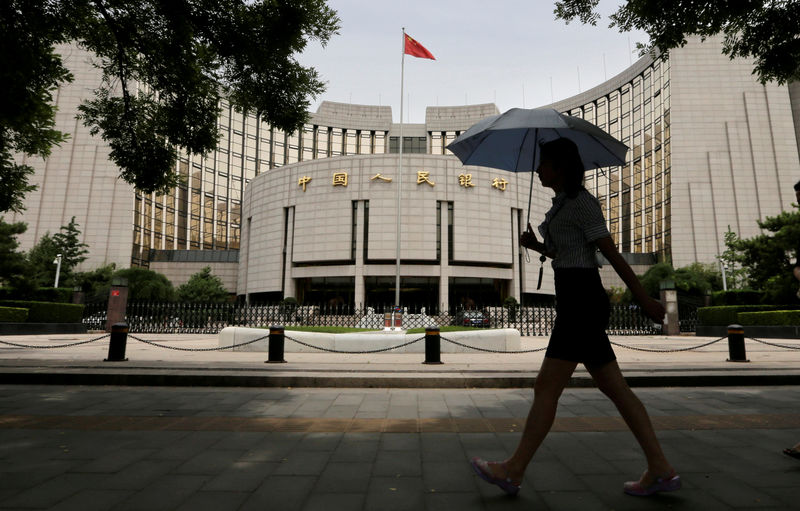 © Reuters. FILE PHOTO: Woman walks past the headquarters of the PBOC in Beijing
© Reuters. FILE PHOTO: Woman walks past the headquarters of the PBOC in BeijingBEIJING (Reuters) – China should better coordinate its economic policies and regulations to boost lending to small firms, a central bank adviser said in remarks published on Tuesday, as the government seeks to prop up growth amid rising trade tensions.
An escalating trade dispute with the United States, rising corporate borrowing costs and steep declines in Chinese stocks and the yuan have raised concerns that the world’s second-largest economy could face a steeper slowdown than had been expected just a few months ago.
“The main focus will be on strengthening the overall coordination of policies,” Ma Jun, a policy adviser to the People’s Bank of China (PBOC), told a financial news outlet affiliated with Xinhua News Agency.
The cabinet’s Financial Stability and Development Commission (FSDC), which is headed by Vice Premier Liu He, should coordinate fiscal, monetary policies, Macro Prudential (LON:) Assessment(MPA) and micro-level regulations, Ma said.
China’s leaders have pledged to make fiscal policy “more active”, following a debate among researchers from the central bank and finance ministry on whether fiscal policy should be used more actively to spur growth.
China’s small and private firms face increased financing difficulties as banks grow more concerned about credit quality, Ma said. Tighter official scrutiny of local government investment projects has also reduced their demand for loans.
The PBOC has been pumping out more cash by cutting banks’ reserve requirement ratios (RRR) this year, but it has long struggled to channel credit to small firms, which are vital for economic growth and job creation, analysts said. Larger state firms, meanwhile, have traditionally had much easier and cheaper access to credit.
A central bank adviser said last week China should limit the credit impact of its multi-year campaign to reduce risks in the financial system, voicing concern that the tightening may have gone too far.
Ma also said the central bank should further improve its targeted RRR cuts and the MPA mechanism to better serve smaller firms.
The MPAs are quarterly health checks of financial institutions to determine their risk exposure, and reporting requirements have been getting progressively tougher.
In the long term, the PBOC bank should adopt a new benchmark policy rate as the intermediate policy target to replace the existing bank lending and deposit rates to help improve its policy mechanism, Ma added.
China’s new bank loans hit a five-month high in June, but annual growth in outstanding total social financing slowed to 9.8 percent, the slowest on record, while broad M2 money supply growth also hit a record low of 8 percent, indicating the regulatory tightening is having an impact.
Fusion Media or anyone involved with Fusion Media will not accept any liability for loss or damage as a result of reliance on the information including data, quotes, charts and buy/sell signals contained within this website. Please be fully informed regarding the risks and costs associated with trading the financial markets, it is one of the riskiest investment forms possible.
Source: Investing.com


























